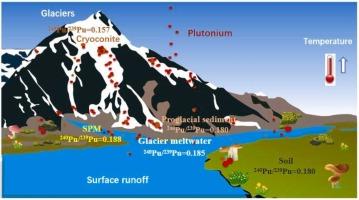当前位置:
X-MOL 学术
›
J. Hazard. Mater.
›
论文详情
Our official English website, www.x-mol.net, welcomes your
feedback! (Note: you will need to create a separate account there.)
Ice cap functioned as a sink for radioactive contaminant in the Tibetan Plateau: Evidence from plutonium isotopes
Journal of Hazardous Materials ( IF 12.2 ) Pub Date : 2024-12-04 , DOI: 10.1016/j.jhazmat.2024.136791 Liguo Cao, Yijia Gao, Zhengchao Zhou, Ning Wang, Zhangwen Liu
Journal of Hazardous Materials ( IF 12.2 ) Pub Date : 2024-12-04 , DOI: 10.1016/j.jhazmat.2024.136791 Liguo Cao, Yijia Gao, Zhengchao Zhou, Ning Wang, Zhangwen Liu

|
Cryoconite is abundant in artificial radionuclides such as plutonium (Pu) and amounts of radioactive contaminants is stored in glaciers. Under global warming and glaciers rapid retreating, glaciers could be a second source for radioactive contaminants and the stored Pu isotopes could be released to the downstream areas through surface runoff. However, the knowledge and understanding on the migration behavior and cycling of Pu isotopes in the ice cap is quite limited. In the present work, we analyzed the 240 Pu/239 Pu atom ratio and 239+240 Pu activity concentration in suspended particulate matter (SPM) and distribution coefficient (K d ) was estimated in glacier runoff in August-one ice cap, northeast Tibetan Plateau. The results showed the lower 239+240 Pu activity concentration in SPM can be attributed to the content of organic matter. The 240 Pu/239 Pu atom ratios in SPM (0.176–0.204), glacial meltwater (0.175–0.200) and proglacial sediments (0.172–0.180) were remarkably higher than that determined in the cryoconite samples (0.064–0.199), suggesting that radioactive Pu in the cryoconite sourced from close-in fallout (Chinese nuclear test) besides the global fallout. Due to the obtained lower K d , lower activity concentrations and relatively higher 240 Pu/239 Pu atom ratios in SPM, we conclude the August-one ice cap currently functions as a sink instead of source for radioactive Pu under climatic warming, and we highlight the necessity for monitoring the dynamic changes of radioactivity for long term in environmental samples in glaciers.
更新日期:2024-12-04

































 京公网安备 11010802027423号
京公网安备 11010802027423号